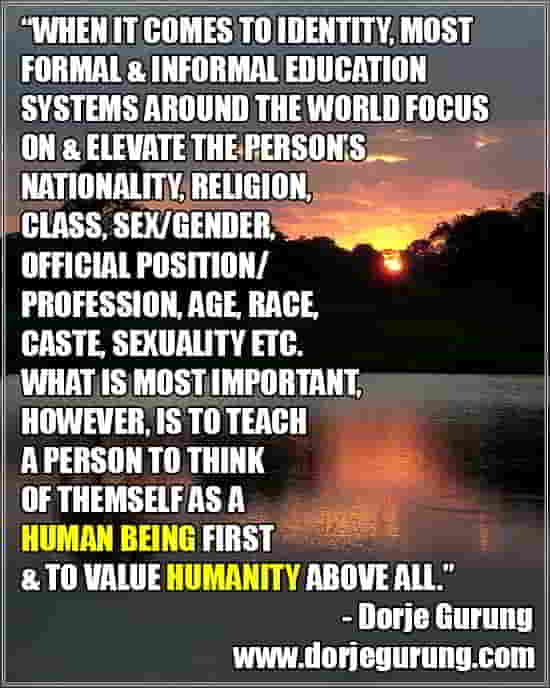
When it comes to identity, most formal and informal education systems around the world focus on and elevate all the wrong aspects of it, such as the person’s nationality, sex/gender, sexuality, religious affiliation, class, official position/profession, age, race, caste etc. What’s wrong with them is that they sow seeds of dissension and create divisions. They create the ideas of “us” and “them,” among other things.
In Nepal for example, Nepali nationality constitutes the most important and is considered by many as the most valuable aspect of one’s identity. Other crucial elements of Nepali identity are caste, gender, and religious affiliation. Not to be limited to or constrained by just them, professional job, professional/official position, class, and age also form part of a person’s identity.
Worse still, a vast majority of Nepalis appear to be convinced of what life is and how it should be lived based mostly on what Nepali society has taught them about who and what they are — their identities. Caste, unfortunately, plays a near central role in that!
To be sure, nationality figuring prominently in one’s identity is NOT unique to Nepal’s education system. That, more or less, is the education system of pretty much every country.
Nationality, religious affiliation, and race based identities fostered by national education system have invariably led to — in a large number of people around the world — blind patriotism and even ultra-nationalism. Blind patriotism or ultra-nationalism invariably involves taking pride in things — and even “defending” — that which they had NO hand in, such as their birth nationality, their birth country, their birth religion, or their birth race or caste etc. Their education system being limited and narrow, the fact that nations, race, caste, gender etc. are all social constructs, is lost on them. Brainwashed by their national education system as they are, that all humans and all living creatures on the planet share a destiny is yet another fact that is lost on them.
For some years now, we have seen the horrid consequences of that in many countries, namely, the ascendancy into positions of power of highly nationalistic political leaders and statesmen with very narrowly defined and short-sighted concerns and interests among other things, and thereby bringing great pain and suffering on many.
What is, however, true is that there are many more important and valuable things that bind than divide — or separate — members of our species, really. If you ask me, what my education in five countries, work experiences in ten, and travels in another thirty or so countries have taught me is that, when you get down to the fundamentals, humans are more alike than different. The three most important intangible needs of pretty much every single human being are to be valued, to live a life of dignity, and to be loved.
Therefore, what is most important when it comes to identity and formal and informal education is to teach a person to think of themself as a human being first and to value humanity above all.
What do you think?
(This blog was reworked from a March 30, 2022 Instagram post.)
